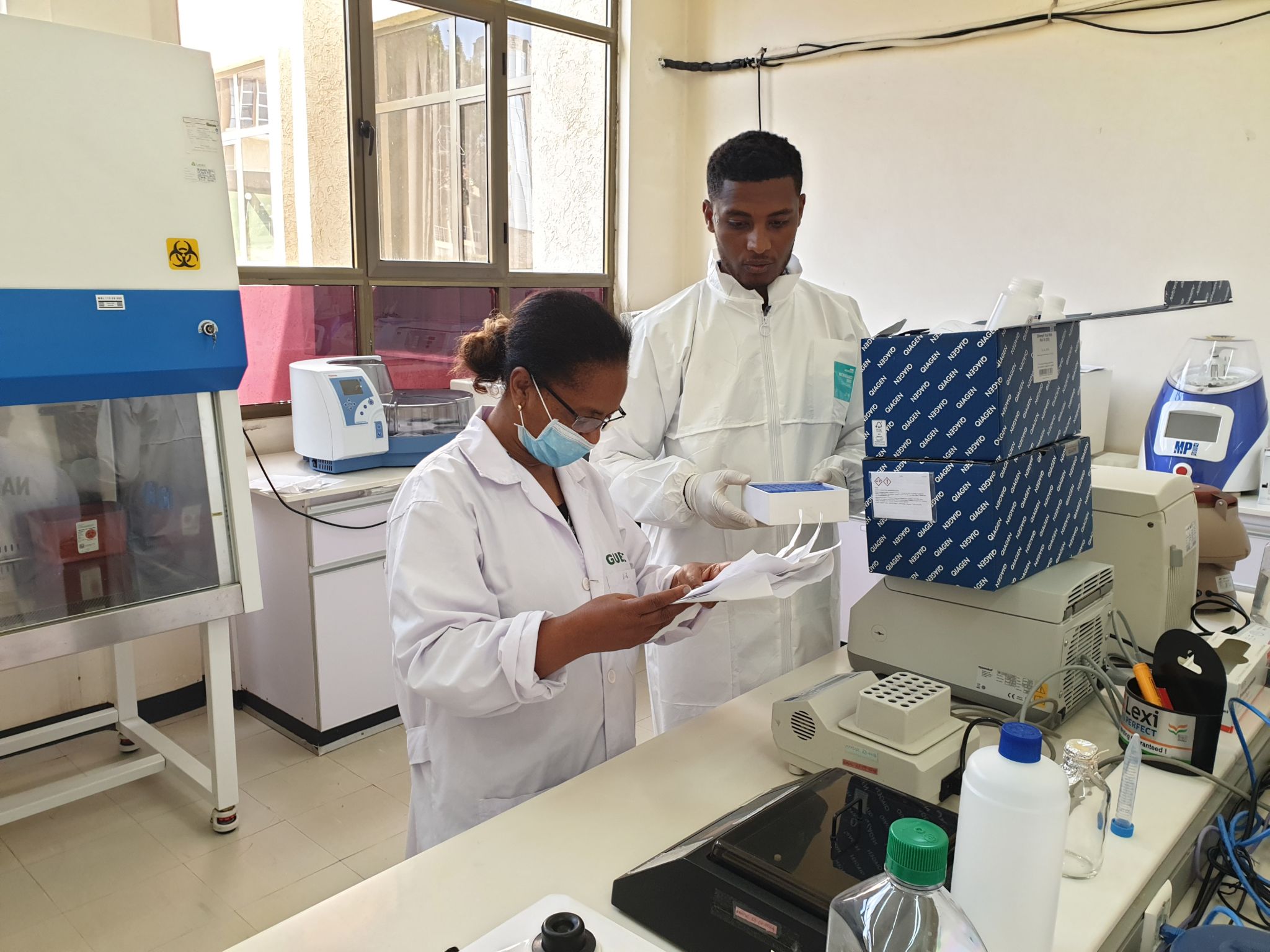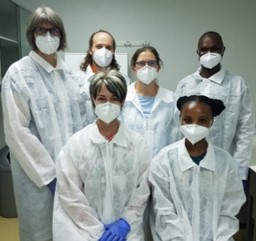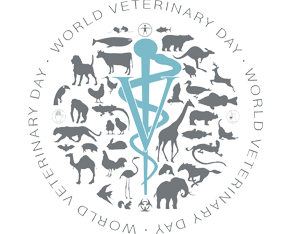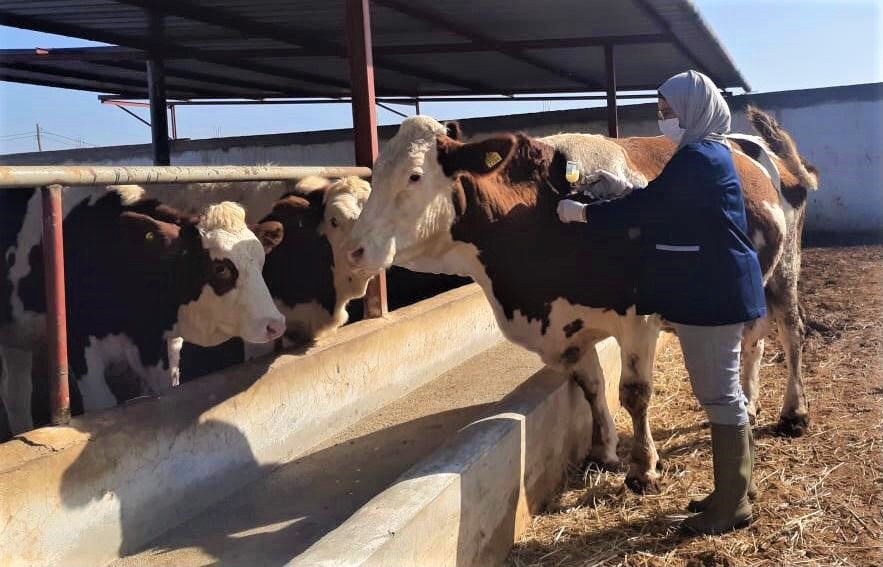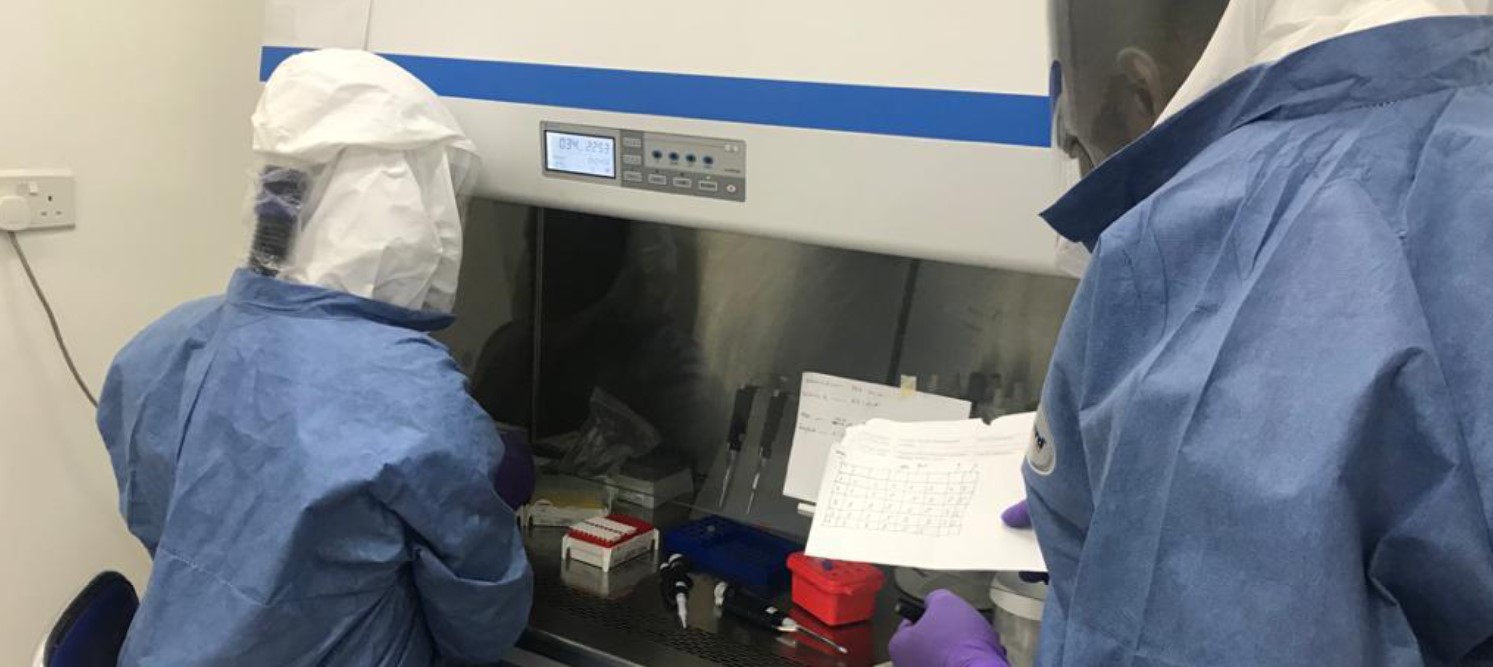
ARC-OVR staff assisting the NHLS in testing COVID-19 samples. Picture (c) ARC (OVR) 2021
The continuing COVID-19 pandemic, caused by severe acute respiratory syndrome coronavirus 2 (SARS-CoV-2) changed life as we know it and significantly affected the global human and animal populations. And yet, through this challenging time, veterinary medicine meaningfully and rapidly evolved, demonstrating veterinarian’s ability to cope, adjust, and adapt; and to continue in their role as leaders of animal health and welfare and public health.
World Veterinary Day WVD
Today’s 2021 World Veterinary Day celebrates the work of veterinarians to protect animal and human health during the Covid-19 Pandemic.
Also, the World Veterinary Association (WVA) and HealthforAnimals are proud to announce the 2021 World Veterinary Day Award, which honours one WVA Member’s activities related to 2021’s theme. Applications are due by 24th of May 2021. Some nice examples from fruitful engagement of the veterinary profession in the COVID-19 response are presented below, from Ghana, Morocco, South Africa and Tunisia; with many heartfelt thanks to Theophilus Odoom, Abderrahman El Abrak, Misheck Mulumba and Nadia Brik.
The COVID-19 pandemic has put considerable pressure on public health services across the globe, which highlighted the need for a One Health approach to dealing with the pandemic. Veterinary services in countries were called upon to go beyond collaborative research and contribute in various ways towards building a common response to the pandemic. For example veterinary laboratories could support diagnostic testing by using their experience and expertise in high throughput testing capacity of infectious diseases to aid in surveillance screening, and the testing of human samples as the need for a diagnostic laboratory to be able to provide accurate and timely diagnostic results is imperative for disease control. Veterinary laboratories are well known for their capacity to handle large sample numbers during outbreaks.
In South Africa, in early 2020 the pandemic resulted in the National Health Laboratory Services (NHLS) becoming overwhelmed with samples due to the high demand and global reagent shortage. The NHLS thus took the decision to outsource some of the diagnostic services required to laboratories with adequate capacity and knowledge in managing large sample numbers in outbreak situations.
The Agricultural Research Council (ARC) was recognized as having the capabilities to assist the NHLS during this pandemic on the ARC-Onderstepoort Veterinary Research (ARC-OVR) campus, through a collaboration between the ARC-OVR and the ARC-Biotechnology Platform (ARC-BTP).
The ARC-OVR is a flagship institution of the ARC recognized nationally and internationally as a veterinary centre of excellence and plays an important role in maintaining the health of South Africa’s livestock and wildlife. ARC-BTP was established in 2010 as a major strategic priority of the ARC. The role of the ARC-BTP is to create the high-throughput resources and technologies required for applications in genomics, quantitative genetics, marker assisted breeding and bioinformatics within the agricultural sector.
The unprecedented nature of this pandemic has developed a fruitful collaboration between the NHLS (as a public health service provider) and the ARC-OVR (as a veterinary centre of excellence) in South Africa and has shown the power of a One Health collaboration.
They receive human specimens directly from the hospitals and other healthcare facilities. The labs also provide walk in services for patients from the hospitals or people with ill-health issues, people who are contact tracing or people who were exposed one way or the other….”
“…Walk in services are also provided for travellers, when people are travelling out of the country and PCR negative is a requirement. They undergo PCR testing in our laboratories and our laboratories are accredited by the Ghana Health Services and our report is accepted by all the airlines.
Finally the laboratories also provide PCR testing for the Ministry of Food and Agriculture, because the Ministry prioritises food security, so staff cannot stay home, they have to go to work, hence the labs provide continuous PCR testing for Ministry of Food and Agriculture staff…”
More in the video below ….
Morocco, like other countries, has not escaped the human health crisis which is the COVID-19 pandemic and has caused unprecedented economic and social disruption in most countries of the world. This crisis has required the implementation of drastic measures by the competent national authorities to reduce the spread of the virus and ensure the control of the disease.
Aware of the importance of animals within the national socio-economic landscape, the need to ensure food safety to protect public health and the contribution to the regular supply of food products to the local market, the Moroccan Veterinary Services of the National Office for the Sanitary Safety of Food Products (Office National de Sécurité Sanitaire des Produits Alimentaires or ONSSA) have relentlessly maintained their animal health and food safety activities since the outbreak of COVID-19 at the national level in March 2020.
Indeed, due to its economic and social importance and its major role in supplying the local market with essential food products (red meat, white meat, table eggs, milk, butter, etc.), the sanitary protection of the national animal herd against the main animal diseases has always been one of the major concerns of the ONSSA’s interventions in order to enable a safe environment for the animals and to allow them to fully express their production potential. At the same time, and in view of its regulatory prerogatives of inspection, as devolved by the State, the Veterinary Services of the ONSSA are entrusted with the food safety of animal products.
The various animal health and food safety actions carried out in the field by the ONSSA are carried out by its Veterinary Services in partnership with private sector-veterinarians, accredited for this purpose, and in collaboration with other stakeholders, in particular other professionals and the territorial authorities.
Following the particular circumstances linked to the COVID-19 pandemic and in keeping with its regulatory missions, ONSSA has continued, in compliance with the preventive measures dictated by the national competent authorities, its health interventions across the national territory to ensure the health protection of the national animal herd and the safety of food products. These interventions consisted in particular of (i) health monitoring and continuous epidemiological surveillance of animal diseases across the national territory, to ensure the reporting of the main epidemiological indicators of diseases and the early detection of any new disease, (ii) the implementation of control programmes targeting the main contagious animal diseases, in particular the implementation of mass-vaccination campaigns of livestock against foot-and-mouth disease, sheep pox and peste des petits ruminants, in addition to dog rabies and anthrax, as well as the pursuit of the livestock identification programme.
All these interventions were carried out by ONSSA, free of charge, for the benefit of livestock farmers, through its Veterinary Services and the private service providers / veterinarians appointed within the framework of a public-private partnership that has been in place for several decades.
At the same time, in terms of food safety, the activities of ONSSA’s veterinary services have been maintained and continue uninterrupted throughout the country during the COVID-19 pandemic, in order to ensure the continuous inspection of food products, particularly in agri-food businesses, slaughterhouses, fish markets and sales outlets, within the framework of local joint committees. The maintenance of these activities is essential to ensure the safety and conformity of food products, ensure the availability of food products in sufficient supply and contribute to consumer protection.
In addition, with regard to trade in animals and animal products, as well as products of animal origin, the ONSSA’s Veterinary Services, in agreement with trading partners, have introduced changes to facilitate the import and export of the above-mentioned goods and ensure business continuity, in particular by adopting health statement and documents in electronic format used for the documentary control of goods at border inspection posts.
Through this brief illustration of the interventions of the Moroccan Veterinary Services during the COVID-19 pandemic, it is appropriate to pay them tribute and to remind ourselves of the crucial role played by the Veterinary Services in the broadest sense of the word (including the public and private sectors), both in protecting and preserving the health status of the country’s animal herd, and in ensuring the safety of food in order to protect the consumer, as well as in supporting the agricultural economy in general and its contribution to food security.
Picture (c) ONSSA (MA) 2020
Exceptional situations call for exceptional measures….
More in the video (in French) below ….
Bamako, Gaborone, Nairobi, Tunis
The World Veterinary Day, initiated by the World Veterinary Association, is celebrated every last Saturday of April since 2000. The OIE during this day pays tribute to the various contributions of the veterinary profession to the health of both animals and humans, underlining the vital role of veterinarians in ensuring animal welfare, food safety, food security, safe world trade in animals and animal products in accordance with its vision “protecting animals, preserving our future “.
The OIE Regional Representation for Africa (RRA) along with its Sub-Regional Representations (SRR) in northern, southern and eastern Africa stand alongside the veterinary professionals on the African continent to amplify the resonance of World Veterinary Day (WVD).
This year the day will be commemorated on Saturday 24 April 2021 and is dedicated to the theme “Veterinarian response to the COVID-19 crisis”, as the current global sanitary situation imposes!
The COVID-19 pandemic started in 2020 and continues to disrupt the balance of our planetary village and our ways of life, resulting in negatively impacting our food supply chains, livelihoods, economies, animal production systems etc.
This unprecedented global crisis has provided us with new evidence that a longstanding and sustainable One Health collaboration is needed. The veterinary profession, through effective and efficient Veterinary Services (VS), is crucial to the successful promotion of a One Health approach for the continuity and maintenance of activities that are crucial to public health.
The RRA and its constituent SRR offices congratulate the African countries that heeded the call by the OIE-WVA in 2020, ensuring that VS were regarded as “essential” for the promotion of public health and trade (https://rr-africa.woah.org/en/news/list-of-african-countries-where-veterinary-services-remain-operational-as-essential-services/). They urge the Veterinary Services and other animal health stakeholders to remain mobilised and adopt new digital advances to face the future challenges that will arise from the uncertainties surrounding the behaviour of the SARS-CoV-2 virus.
Therefore, in the coming days, with the continued persistence of COVID-19 and perhaps other hitherto unknown pandemics, the RRA and the SRR look forward to the continued activities of the veterinary professional’s sustenance to ensure that:
For the coming months and years, the Veterinary Services of the continent are encouraged to foster close(r) collaboration across sectors, work with their network of national and regional experts, to better understand the epidemiology of the disease and to strengthen their capacity to contain this multifaceted crisis. This should culminate in establishing a national coordinated and scalable response mechanism.
Furthermore, the crisis should be used as an opportunity for innovation. The Veterinary Services must influence the future by planning ahead and in doing so, adopt two vital principles: anticipation and preparedness. Together we can!
Happy World Veterinary day!
